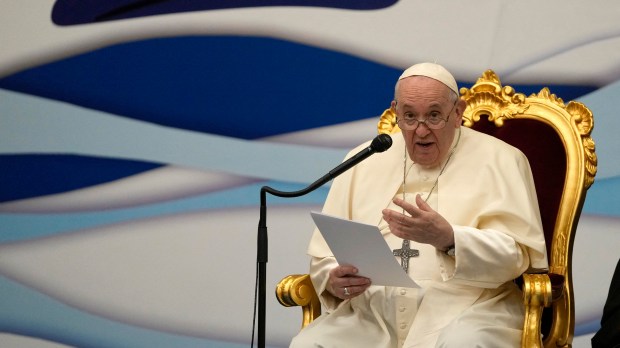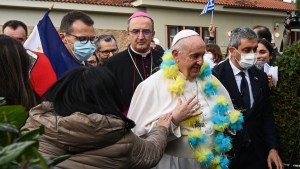In Pope Francis’ last speech during his trip to Cyprus and Greece, the Holy Father addressed the concerns of young people. He responded to their testimonies, speaking on issues such as social media use, and the courage to dream in a complex world with uncertain futures.
He also gave advice on what to do when doubts against faith arise, or are recurring.
“I want to say to you and to everyone here: don’t be afraid of doubts, because they are not a sign of the lack of faith. Don’t be afraid of doubts,” the Pope said.
In fact, the Pope said, doubts should be considered “vitamins of faith” because they help to strengthen faith and make it “more robust.”
They enable faith to grow, to become more conscious, free, and mature. They make it more eager to set out, to persevere with humility, day after day. Faith is precisely that: a daily journey with Jesus who takes us by the hand, accompanies us, encourages us, and, when we fall, lifts us up. He is never afraid to do this.
Faith is like a love story, where we press forward together, day after day. Like a love story too, there are times when we have to think, to face questions, to look into our hearts. And that is good, because it raises the quality of the relationship! This is very important for you, because you cannot travel the path of faith blind, no; instead, dialogue with God, with your conscience and with others.
Did I make a mess of things?
Referring to the testimony of the young woman who spoke of doubts, the Pope addressed the times when “faced with misunderstanding or the difficulties of life, with loneliness or disappointment, doubt can come knocking on the door of our heart. We can think: ‘Maybe something is wrong with me… I think I may have made a mess of things…'”
“That, my friends, is a temptation!” he said. “A temptation to be rejected.”
The devil sows this doubt in our hearts in order to make us gloomy and depressed. What should we do? What can we do when that kind of doubt becomes stifling and persistent, when we lose confidence and no longer even know where to begin? We need to go back to the starting point.
What is that starting point? To understand it, let us listen to what your great classical culture has to say. Do you know the starting point for all philosophy, but also for art, culture and science? Do you know what it was?
All that began with a spark, a realization, captured in the magnificent word: thaumàzein. It began with wonder, with amazement. Philosophy emerged from the sense of wonder about things that exist, about our own lives, about the harmony of nature all around us, and about the mystery of life itself.
Wonder is the beginning of philosophy, and of faith
Pope Francis said that a sense of wonder and amazement is “the beginning not only of philosophy, but also of our faith.”
He noted how often in the Gospel, people are “amazed” at Jesus. “In the encounter with God, amazement is always present, for it is the beginning of dialogue with God.”
This, he said, points to the fact that faith is not a “list of things to believe or rules to follow.”
Instead, said the Pope, faith is “a reality, a beautiful truth that does not depend on us and that leaves us amazed: we are God’s beloved children!“
This is what faith is in its deepest sense: we are God’s beloved children! We are beloved children because we have a Father who watches over us and who never stops loving us. Think about this: whatever you may think or do, even the worst things possible, God continues to love you.
I want you to understand this well: God never tires of loving. Someone might say to me: “But if I slip into the worst of things, does God love me?” God loves you. “And if I am a traitor, a terrible sinner and end up badly, in drugs… does God love me?” God loves you.
God always loves. He cannot stop loving. He loves always, without exception. He looks at your life and sees that it is good (cf. Gen 1:31). He never abandons us.
Don’t start the day looking in the mirror
Pope Francis encouraged his listeners to let go of the concerns that arise when we look in the mirror, and instead, stand before God, and let our perspective change.
We cannot help but be amazed that, for all our sins and failings, for him we are, and always will be, his beloved children.
So, instead of starting the day by looking in the mirror, why not open your bedroom window and focus on everything beautiful that exists, on the beauty that you see all around you?
You are infinitely more beautiful
Pope Francis urged the youth:
Dear young people, think about this: if nature is beautiful in our eyes, in God’s eye each of you is infinitely more beautiful! Scripture says: “He has wondrously made us” (cf. Ps 139:14).
In God’s eyes we are a wonder. Allow yourself to be caught up in that wonder. Let yourself be loved by the One who always believes in you, by the One who loves you even more than you succeed in loving yourself.
It is not easy to understand the breadth and depth of God’s love, it is not easy to grasp it, but it is like this: simply let yourself be gazed upon by the gaze of God.
Another wonder: forgiveness
The Pope also insisted that the young people be confident in God’s forgiveness.
When you feel sorrow for something you have done, you should feel another kind of wonder: the wonder of forgiveness. I want to be clear about this: God always forgives. We can grow tired of asking for forgiveness, but he always forgives. In that wonder of forgiveness, we rediscover the Father’s loving face and peace of heart.
He gives us a new beginning and he pours out his love in an embrace that lifts us up, dispels the evil we have done, restores the irrepressible beauty that is within us as his beloved children, and enables it to shine forth.
3 Thieves
The Pope warned against three things that could rob us of this treasure of forgiveness: laziness, fear, and shame.
May we always be amazed by God’s love! We will rediscover ourselves: not what other people say about us, or where the whims of the moment may lead us, or the hype we are in advertisements, but our deepest reality, the truth that God sees, the one he believes in: our unique beauty.
Referring again to the culture of his hosts, Pope Francis asked them to remember the words engraved on the Delphi temple: Know thyself.
Nowadays, we risk forgetting who we are, becoming obsessed with appearances, bombarded with messages that make life depend on what we wear, the car we drive, how others see us… Yet those ancient words – know thyself – remain valid today.
Realize that your worth is in who you are and not what you have. Your worth is not in the brand of the dress or shoes you wear, but because you are unique.
We are Christians not out of duty, but out of beauty
And he offered another image from Greek culture: the sirens, the mythological creatures who would enchant sailors with their beautiful songs, and cause them to crash into the rocks.
Today’s sirens want to charm you with seductive and insistent messages that focus on easy gains, the false needs of consumerism, the cult of physical wellness, of entertainment at all costs… All these are like fireworks: they flare up for a moment, but then turn to smoke in the air. I understand, they are not easy to resist.
Do you remember how Odysseus did it, threatened by the sirens? He had himself tied to the ship’s mast.
Another ancient figure, Orpheus, teaches us a better way. He sang a more beautiful melody than that of the sirens, and thus reduced them to silence. That is why it is important to cherish the wonder, the amazement, the beauty of faith! We are Christians not out of duty, but out of beauty.
And precisely because we want to cherish that beauty, we have to say no to anything that would mar it. The joy of the Gospel, the wonder of Jesus, makes our sacrifices and struggles fade into the background. Don’t you agree? Remember this: being a Christian is not essentially about doing this or that, about doing things. We must do things, but Christianity is not essentially that. In the end, being a Christian is about letting God love you and recognizing that you are a unique individual in the face of the love of God.


